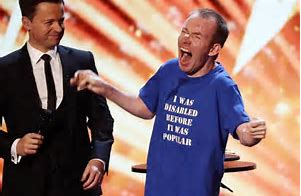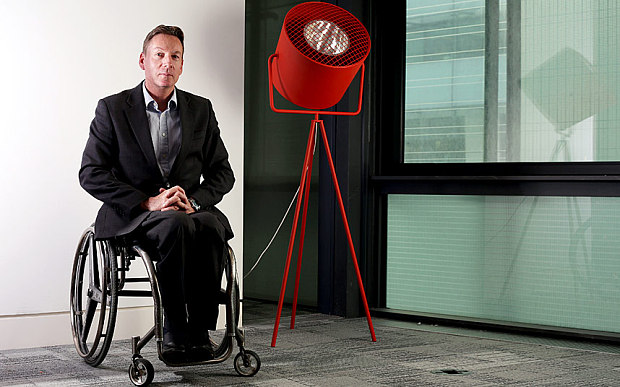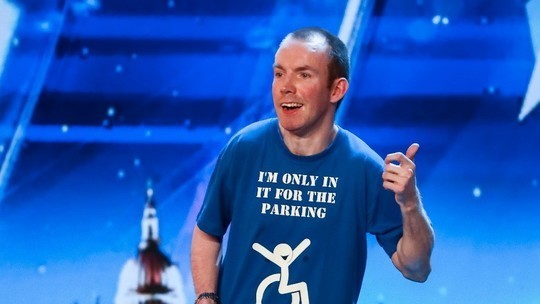
On Saturday 2nd June 2018, Lee Ridley, who performs as the comedian ‘Lost Voice Guy’, won the 2018 series of ITV’s Britain’s Got Talent. His win was remarkable for a number of reasons, most importantly he is the first comedian to win. He also has Cerebral Palsy. Cerebral Palsy is a group of lifelong conditions, developing early in life, that effect movement and co-ordination. As a result, Lee Ridley is unable to speak. Instead, he uses a machine called a Lightwriter to speak for him. Here is ‘Lost Voice Guy’ in action:
The runner-up in this year’s Britain’s Got Talent, Robert White, who is also a comedian, identifies as having Asperger Syndrome (a neurodiversity that is part of Autism). Both performers made light of their own disabilities or additional needs during their acts. They referenced their conditions and people’s reaction to them as part of their performance
The audience ratings for the final were the highest since 2015, with an average of 8.7 million viewers.
Is the fact that the winner and runner-up of this popular TV show both have disabilities or additional needs significant? Is this a game changer for disability in the media?
Image: ‘Lost Voice Guy’ with the host of ITV’s ‘Britain’s Got Talent’, Declan (Dec) Donnelly, at the moment that he is announced as the 2018 series winner.
It is still rare to see positive portrayals of disabled people on television, particularly on shows like Britain’s Got Talent. Looking back through the TV archives, it is more common to see disabled people being used as the butt of jokes or hate speech. Often in ways that would be considered completely unacceptable if they targetted race, gender, sexual orientation, etc.
In the 1990’s ‘Little Britain’ which starred current Britain’s Got Talent judge David Walliams, also featured Matt Lucas as a disabled character who was secretly able bodied. This suggests that some disabled people fake their conditions in order to claim welfare benefits. It was a hugely popular show of is time and is regularly re-run.
The Channel 4 TV comedy show ‘The Last Leg’, currently in its 13th series, features characters played by disabled people, who use their disabilities to comic effect.
‘Lost Voice Guy’ describes himself as: “Lost Voice Guy's real name is Lee Ridley. That's me! I am a writer, journalist, comedian and geek who is based in Newcastle Upon Tyne, England. I also have Cerebral Palsy. I have no speech (I use a small machine called a Lightwriter to speak) and I walk with a limp. Don't worry though, you can't catch it from me. It just means that you better not get stuck behind me on the stairs if there's a fire.”
He continues to outline his varied career to date, his academic qualifications (Masters and undergraduate degrees in journalism), his wide range of hobbies etc. You can see his website here:

Other disabled people regularly seen on television include Frank Gardner, who is a journalist and the BBC’s Security Correspondent. Gardner was disabled in 2004 when shot six times by terrorists; his friend and cameraman was killed. He is regularly provides specialist security commentary on BBC news programmes.
Former CBeebies presenter  who was born missing the lower section of her right arm and hand, left the channel last year, after eight years. She reported being subject to hurtful comments by parents who said that her disability scared their children. One man said that he would stop his daughter from watching the BBC children’s channel because Burnell wouldd give his child nightmares.
who was born missing the lower section of her right arm and hand, left the channel last year, after eight years. She reported being subject to hurtful comments by parents who said that her disability scared their children. One man said that he would stop his daughter from watching the BBC children’s channel because Burnell wouldd give his child nightmares.
More recently, Lucy Martin, who was also born without her right forearm and hand, became the first visibly disabled BBC weather presenter. Her experience has been more positive, while she has received some unpleasant comments, the feedback generally has been positive.
The increase in media channels and self-broadcast channels such as YouTube has also led to many more disabled people using these to reach an audience. This development gives disabled people a personal platform and voice.
 If programmes such as ‘Little Britain’ made fun of people because they were black, or female, or transgender, then the backlash would be enormous. It is rightly regarded as off limits on mainstream prime time television to belittle people due to their race, gender, sexual orientation etc.This rule doesn’t seem to apply in the same way to disability. Disabled people are routinely ridiculed, abused and attacked, with little or no seemingly provided.
If programmes such as ‘Little Britain’ made fun of people because they were black, or female, or transgender, then the backlash would be enormous. It is rightly regarded as off limits on mainstream prime time television to belittle people due to their race, gender, sexual orientation etc.This rule doesn’t seem to apply in the same way to disability. Disabled people are routinely ridiculed, abused and attacked, with little or no seemingly provided.
Question: Is there is a ‘pecking order’ for equality? If you had to rank e.g. race, age, religion/beliefs, gender, sexual orientation, disability, etc. how would it look, and why?
Question: Do you feel that strong advocacy from campaign groups such as Stonewall, as well as social media campaigns such as #MeToo and #TimesUp, might have influenced this? How?
It has been suggested that the success of ‘Lost Voice Guy’ shows a shifting of public opinion regarding disabled people. Excellent attendance figures for the Paralympic Games as well as the Invictus Games have shown that there is an appetite for disabled sport. It is possible that these changing attitudes could extend into other areas of life.
Question: Does the recent success of ‘Lost Voice Guy’/Lee Ridley and Robert White change things for the better by raising awareness? Or were the public watching and voting for them in some modern parody of the ‘Freak Shows’ of the Victorian era?
Question: Does increased visibility of disabled people, especially ‘successful’ people, make it less likely that the kinds of cruel comments Cerrie Burnell was subjected to will be repeated? Why?
With one in five of the population of the UK having some additional need or disability, disability isn’t a rarity that is hardly ever seen. Everyone knows people with disabilities, many of us have disabilities ourselves. There seems to be a disconnect between what we see and experience in the ‘real world’ and what we see on the carefully curated environment of television. It is unlikely that a disabled person is going to be selected as a contestant for ‘Love Island’ anytime soon for example.
Seeing disabled contestants on Britain’s Got Talent could be seen as a positive move, but we won’t have fully succeeded in normalising disability until every role is available to anyone. When we have a disabled Dr. Who, a disabled Sherlock, a disabled host of Britain’s Got Talent or Blue Planet III then we might be closer to normalisation.
Question: Is this goal achievable? Are there any roles on television, for example, that you could never see being available to disabled people? Why?
Let’s look at two Bible stories, one from the Old Testament, one from the New Testament, that shine a light on how our attitudes and our relationships with disabled people might be different to the cultural norms we see on television:
We first encounter Mephibosheth as a young boy. We read that the same day he learned that his father and grandfather were dead, an accident resulted in him having a physical disability in his feet; “Jonathan son of Saul had a son who was lame in both feet. He was five years old when the news about Saul and Jonathan came from Jezreel. His nurse picked him up and fled, but as she hurried to leave, he fell and became disabled. His name was Mephibosheth.”
In 2 Samuel 9, David enquires if there are any surviving family members of his friend Jonathan. He is informed that there is one, Mephibosheth, "one of Jonathan’s sons is still alive. He is lame in both feet.” David seemingly ignores Mephibosheth’s disability as irrelevant and invites him back into the royal court, to a place of honour, in memory of his friendship with his father, Jonathan. Mephibosheth then ate at the King’s table every day. He was welcomed because he was wanted, not because of any influence he had, not because he was disabled, but because of who he was.
Question: How does the way that David welcomed Mephibosheth into his royal court challenge the way we think about people with disabilities? Are they wanted? Do we give them a place of honour? Do we see the person first, instead of the disability?
(Luke 9:11, Luke 5:17-26, Luke 6:9)
From Jesus’ encounters with people with additional needs or disabilities, we could wrongly assume that their sole motive for meeting Jesus is to be healed. We must remember that many of them had heard Jesus’ teaching first, had been drawn to Jesus by what he said as much as by what he did.
Look in Luke 9:11, Jesus had just sent out the 12 disciples to announce God’s kingdom and to heal the sick. They had returned and with Jesus had gone on to Bethsaida… “But the crowds learned about it and followed Jesus. He welcomed them and spoke to them about God’s kingdom. He also healed those who needed to be healed.” He welcomed them, all of them, and spoke to them about God’s kingdom. He taught them all and healed those who needed it. The teaching came before the healing.
Think about the man lowered through the roof by his friends. It is always assumed that the man’s friends brought him to Jesus for healing, and this is entirely likely, but as we read the Gospel account it doesn’t say that. It just says they brought him to Jesus, and unable to get in through the door they lowered him through the roof. It’s just as likely that they were there for the teaching as well. Jesus himself responded to the man by recognising his faith and the faith of his friends first, “Son, your sins are forgiven”. The healing was a demonstration of his authority to forgive sins. Teaching first; healing second. Person first; additional needs second.
What these stories teach us is that everyone is equal when it comes to Jesus; he came for all, to share the Good News with all, for all to respond to him. When children, young people, or adults with additional needs come to our churches, our primary focus should be, to welcome share the Gospel message. To see the person first, and the additional needs or disability second. That doesn’t mean that we ignore their needs, of course not… but what Jesus was trying to teach the Pharisees and Teachers of the Law 2,000 years ago, and is still teaching us today, is that every person matter. He wanted them, and us, to see the person first.
And then having made sure they (and us) had seen the person, he asked this question, “Should we do good? Or should we do evil? Should we save life? Or should we destroy it?” Luke 6:9.
Question: What does that mean for us today? I think it could be about ensuring that everyone, everyone, is welcomed and gets to hear the Gospel message; gets to have the opportunity to respond to Jesus’ teaching.
Question: If we follow Jesus’ example and welcome everyone into our churches, see the person first, and enable them to belong, to take part, to access the teaching and to learn and respond, to be able to teach others in turn, we are doing good, we are saving life. What do you think?
Invite the group to recollect this year’s Britain’s Got Talent series, and the contributions of ‘Lost Voice Guy’ and Robert White. What did they enjoy about it? What did they find funny, and why?
What other disabled people or characters can they think of from television? When they think of them, what views do they have? Are these positive or negative? Why? Discuss the people mentioned in the ‘What’s the Background’ section above.
Discuss the ‘Issues’ section above, asking the group the questions posed. What do they think of these issues? Are there other issues they can think of?
Introduce the Bible perspective, looking at the story of Mephibosheth as well as the people Jesus met and his approach to them. How do these stories make them feel? Ask the questions posed in this section, what is their response?
Pray that our attitudes would be like those of Jesus, who saw the person first, their need for salvation as paramount, and any disability as important but secondary. Pray that we will work with disabled people in our church to help everyone to belong, participate and serve. Pray that the church will become a beacon for society at large, including television, about equality for all disabled people.
Lost Voice Guy’s website: http://lostvoiceguy.com
Britain’s Got Talent YouTube channel: https://www.youtube.com/channel/UCUtZaxDF3hD5VK4xRYFBePQ
Useful BBC article: https://www.bbc.co.uk/news/entertainment-arts-44354287
For more information about Cerebral Palsy: http://www.cerebralpalsy.org.uk
The Additional Needs Blogfather’s blog site (bible/theology section): https://theadditionalneedsblogfather.com/category/bible-theology/
Mark Arnold
Additional Needs Ministry Director
Urban Saints